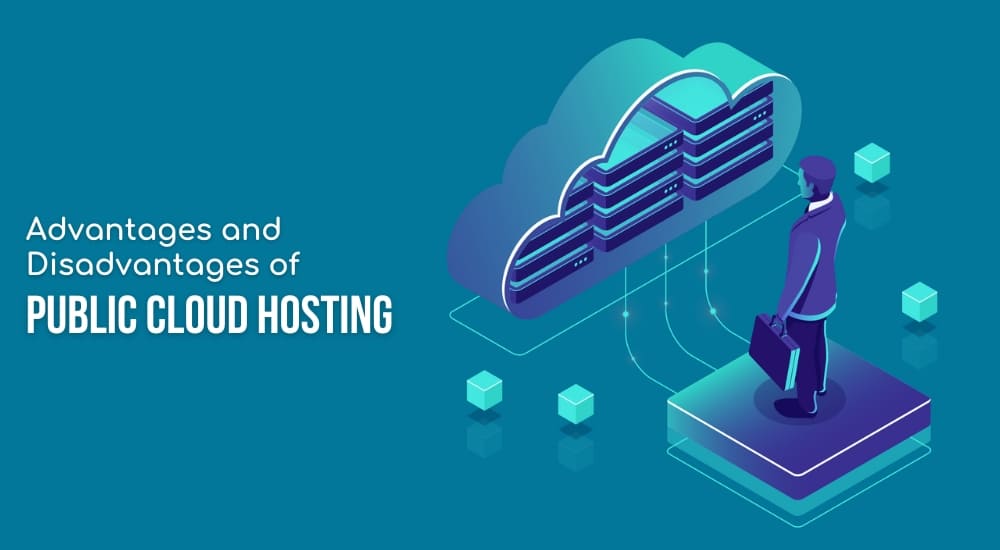
Advantages and Disadvantages of Public Cloud Hosting
In this digital world of business and technology everyone wats the flexible option to store the data and runs many applications without paying money. So, the scalable and flexible solution is Public Cloud Hosting. This allows the users to store any kind of data and use the software applications which is provided by the third-party users and they maintained it very well. The third-party providers are AWS, Microsoft Azure and Google cloud. In this blog we are going to discuss all the advantages and disadvantages of Public cloud hosting. We will also guide you about the decision you have made for public cloud-hosting is right or not.
Table of Contents
ToggleWhat is Public Cloud Hosting?
Let’s first understand what public cloud hosting is before we discuss the pros and cons. Public cloud hosting uses third-party-owned cloud services and infrastructure. Third-party providers make their services available to the general public, and users can access them through the Internet. Cloud servers are shared among many users, which helps in cutting costs.
Advantages of Public Cloud Hosting
Cost-Effective
One of the great benefits of public cloud hosting is that it is cost-efficient. Since the infrastructure provider maintains the infrastructure, there is no need to buy hardware. You only pay for resources used, such as storage or processing power, and this makes it highly convenient for budgeted businesses and individuals.
Scalability
Public cloud hosting is highly scalable, enabling you to scale up or down according to your needs. For example, in case of a traffic storm, you can easily increase storage or processing power for the increased demand. This way, you only pay for what you need at any given time.
Reliability and Uptime
Most leading cloud providers have numerous data centers around the globe, including AWS and Microsoft Azure. Thus, their networks are extremely reliable and highly up-to-date. Even in case one data center fails, your data can be switched to another automatically, hence less probable that your website or application will go down.
Automatic Software Updates
A Cloud provider will also be taking responsibility for maintaining the infrastructure hardware and software. It therefore doesn’t require the person installing the updates of software. The cloud service provider would take care of that in order to make sure you have the most up-to-date security patches installed at all times.
Easy Accessibility
Public cloud services are accessible through an internet connection from anywhere in the world. This would allow you to access your data or applications from your home, office, or even while traveling. This is a perfect model for businesses that have to support remote teams or workers always on the go.
Improved Security
While security in public cloud hosting is provider-dependent, great cloud services have robust security features. Data encryption, firewalls, and other security measures safeguard information to the fullest extent with many cloud providers. Experts monitor the system 24/7 and report potential threats to ensure system security.
Disadvantages of Public Cloud Hosting:
Limited Control
The disadvantage of public cloud hosting is that the infrastructure is less in control. Since the server belongs to the provider, you cannot make manual changes to the hardware and software settings. This would not be suitable for businesses requiring more customization or specific configurations.

Potential Downtime
Even though public cloud providers try to achieve very high uptime, there will still be downtime. Anything unforeseen like a server failure or the onset of natural disasters may affect your availability of data or applications. Though most providers implement backup systems, there still exists a chance that your service will not be accessible even for some time.
Security and Privacy Concerns
Cloud providers do have strong measures to implement security, however security and privacy concerns can always be there. Putting your sensitive data on servers of remote locations means one trusts a third party to secure them. If a hacker could somehow get access to cloud infrastructure, your data was vulnerable to them. Therefore, need to identify a reputable cloud provider and secure that data to be encrypted and so protected.
Data Transfer Speed
Since public cloud services reside on remote servers, you will rely on your Internet to access your data. Depending on your Internet speed, this may delay data transfers between your local machine and the cloud. This impacts performance for applications or websites requiring a lot of fast-accessing data.
Compliance Issues
For some companies, especially regulated industries like healthcare or finance, data protection laws must be met. Public cloud hosting is not always fully compliant with the regulatory standards set by regulatory bodies. Before selecting a public cloud provider, it should be ensured that they meet the necessary standards for your business.
Shared Resources
In public cloud hosting, lots of users share the same physical resources such as servers and storage. It means that performance could be affected by another user’s activities. This could potentially slow down an application or a website if the other user is consuming too much bandwidth or processing power.
Conclusion
Public cloud hosting has some benefits, such as cost-saving, scalability, reliability, and easy accessibility. Still, it has some disadvantages as well, such as losing control, security issues, and possible downtime.
Public cloud hosting is generally recommended for businesses and individuals seeking flexible, cost-effective solutions. However, one must consider all of his or her needs, budget, and the amount of control he or she requires.
Frequently Asked Questions
- Shared Resources
- Pay-as-You-Go Pricing
- No Need for Infrastructure Investment